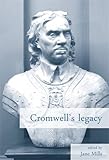
Jane Mills, ed. Cromwell's Legacy. Manchester: Manchester University Press, 2012. x + 306 pp. $100.00 (cloth), ISBN 978-0-7190-8089-0.
Reviewed by Timothy Cooke (Norwich University)
Published on H-War (January, 2013)
Commissioned by Margaret Sankey (Air University)
Oliver Cromwell’s Modern Heritage
Jane Mills, a fellow of the Historical Association, a member of the Royal Historical Society, and trustee of the Cromwell Association, has assembled an immensely qualified panel to present essays on various aspects of Oliver Cromwell, from the current state of “Cromwelliana,” to his innovations on military organization and philosophy, both domestically and internationally. The introduction, by John Morrill, provides an interesting summary of the historiography of Cromwell. My perspective differs from Morrill’s depiction of this book as contrasting Roger Richardson’s excellent anthology, Images of Oliver Cromwell (1993), by being “in contrast, not anglocentric” because it contains contributions on Ireland, Scotland, and North and South America (p. 3).
Mills’s edited collection includes John Goldsmith’s review of personalia associated with Cromwell, Alan Marshall’s analysis of “Cromwell’s military legacy,” and Toby Barnard’s twist on “Cromwell’s Irish reputation.” Barnard, Laura A. M. Stewart, Francis J. Bremer, and Karen Racine, respectively, offer new and rarely analyzed pieces of Cromwell’s impact on areas outside England. Bremer’s essay, “Cromwell’s Ghost: The Legacy of England’s Puritan Revolution in New England,” is particularly interesting for any student of colonial America.
Marshall, in “Pax quaeritur bello: The Cromwellian Military Legacy,” provides an excellent historiography of Cromwell’s impact on British military thought, especially regarding the concept of a standing, professional army, from the death of Cromwell in 1658 through the early eighteenth century and the career of John Churchill, Duke of Marlborough. Oddly, although Marshall recounts in vivid terms the fears British society had of “the spectre of the Cromwellian military legacy; indeed it raised the noisy cry of treason and ‘Cromwell and the military power’ and accusations against Marlborough of his wishing to become a ‘Perpetual Dictator,’” Marshall is curiously blank on the period between Marlborough’s death in 1722 and the career of the Duke of Wellington in the early nineteenth century (p. 125). Neither further developments in Britain nor even more compelling events in North America seem worthy of his attention.
A standing army concerned England’s American subjects and informed the debates over relevant provisions in the embryonic Constitution of the new United States. In an article published in 1995, historian Louise A. Breen points to a 1638 entry in Governor John Winthrop’s journal recording the suspicions of the Massachusetts Bay Colony’s General Court. “Recognizing ‘how dangerous it might be to erect a standing authority of military men, which might easily, in time, overthrow the civil power,’ he wrote, the Court ‘thought fit to stop it betimes.’”[1] These debates dictated how colonial militias were organized and controlled, and were reflected over a hundred years later in the concerns of America’s Founding Fathers, including Elbridge Gerry, John Rutledge, Roger Sherman, and Edmund Randolph. At least six of the Federalist Papers, authored by Alexander Hamilton, James Madison, and John Jay, deal with their apprehensions over standing armies. Obviously, these fears were formed by Cromwell’s legacy, but Marshall fails to study American colonial formative experiences.
Cromwell’s legacy is a valuable addition to any twenty-first-century scholar of “one of a small number of British historical figures to be instantly recognizable, at least in Britain and Ireland” (p. 1).
Note
[1]. Louise A. Breen, “Religious Radicalism in the Puritan Officer Corps: Heterodoxy, the Artillery Company, and Cultural Integration in Seventeenth-Century Boston,” The New England Quarterly 68, no. 1 (March 1995): 3.
If there is additional discussion of this review, you may access it through the network, at: https://networks.h-net.org/h-war.
Citation:
Timothy Cooke. Review of Mills, Jane, ed., Cromwell's Legacy.
H-War, H-Net Reviews.
January, 2013.
URL: http://www.h-net.org/reviews/showrev.php?id=36366
 | This work is licensed under a Creative Commons Attribution-Noncommercial-No Derivative Works 3.0 United States License. |




